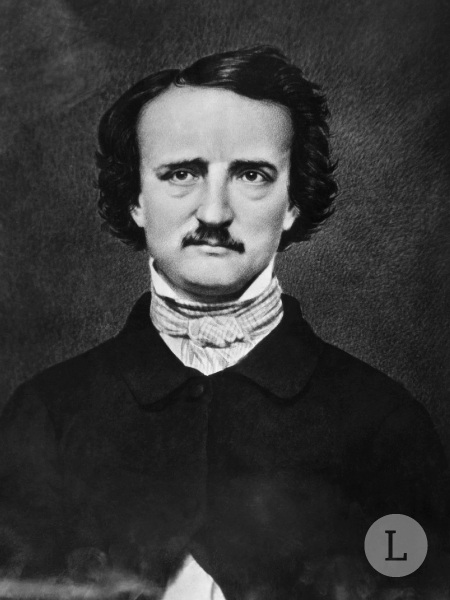
born: JANUARY 19, 1809
died: OCTOBER 7, 1849
nationality: AMERICAN
movement: DARK ROMANTICISM
Edgar Allan Poe was an American writer, poet, and literary critic whose macabre and mysterious works continue to captivate readers around the world. Best known for his tales of horror and the supernatural, Poe was a master of suspense and a pioneer of the detective fiction genre. His innovative and imaginative storytelling left an indelible mark on American literature and inspired generations of writers.
EARLY LIFE AND FAMILY BACKGROUND
Edgar Allan Poe was born on January 19, 1809, in Boston, Massachusetts, to Elizabeth Arnold Hopkins Poe and David Poe Jr., both traveling actors. After the death of his parents in 1811, he was taken in by John Allan, a wealthy merchant from Richmond, Virginia, and his wife, Frances. Although Poe was never formally adopted, he took the Allan surname as his middle name.
Poe’s early life was marked by financial instability and frequent moves, including a five-year stint in England, where he attended boarding school. In 1826, he enrolled at the University of Virginia but was forced to leave after a year due to mounting gambling debts and strained relations with his foster father.
WRITING CAREER AND PERSONAL STRUGGLES
Poe turned to writing as a means of supporting himself and published his first book, Tamerlane and Other Poems, in 1827. He enlisted in the U.S. Army and was accepted into West Point in 1830, but was soon dismissed for disciplinary reasons.
Over the next two decades, Poe worked as an editor and critic for various literary magazines while continuing to write and publish his own works. His stories and poems gained widespread acclaim, but financial success eluded him. Poe’s personal life was fraught with tragedy, including the death of his young wife, Virginia Clemm, in 1847.
TOP 10 BOOKS BY EDGAR ALLAN POE
The Raven (1845)
This haunting narrative poem tells the story of a man tormented by a talking raven, whose ominous refrain of “Nevermore” drives him to the brink of madness.
The Tell-Tale Heart (1843)
A chilling short story about a murderer driven to confess his crime by the sound of his victim’s beating heart.
The Fall of the House of Usher (1839)
A Gothic tale of a decaying family mansion and its ill-fated inhabitants, exploring themes of madness, isolation, and supernatural terror.
The Murders in the Rue Morgue (1841)
Considered the first modern detective story, this tale follows the brilliant investigator C. Auguste Dupin as he solves a gruesome double murder in Paris.
The Cask of Amontillado (1846)
A dark tale of revenge and murder, as a man lures his enemy into the catacombs under the pretense of tasting a rare wine.
The Masque of the Red Death (1842)
A chilling allegory of mortality, as a group of nobles attempt to escape a deadly plague by secluding themselves in a lavish, isolated castle.
Annabel Lee (1849)
A haunting and melancholy poem about the narrator’s love for a young woman named Annabel Lee, who tragically dies.
The Pit and the Pendulum (1842)
A suspenseful story about a man imprisoned and tortured during the Spanish Inquisition, as he faces the terrifying prospect of being sliced in half by a slowly descending pendulum.
The Black Cat (1843)
A macabre tale of a man’s descent into madness, as he becomes consumed by hatred for a black cat that seems to possess supernatural powers.
Ligeia (1838)
A story of obsessive love and resurrection, as the narrator becomes convinced that his deceased wife, Ligeia, has returned to life in the body of another woman.
INTERESTING FACTS
- Poe’s tumultuous relationship with his foster father, John Allan, led to disinheritance and financial hardship throughout his life.
- A master of cryptography, Poe published a challenge to his readers to submit ciphers for him to solve. He successfully cracked every code sent to him.
- Poe’s wife, Virginia Clemm, was also his first cousin. They married when she was only 13 years old.
- The Baltimore Ravens, an American football team, were named in honor of Poe’s poem The Raven.
- Poe was a prolific literary critic, coining the term “short story” and often writing scathing reviews of his contemporaries’ works.
POE’S MYSTERIOUS DEATH AND LASTING LEGACY
Edgar Allan Poe died under mysterious circumstances on October 7, 1849, at the age of 40. He was found in a delirious state on the streets of Baltimore, wearing clothes that did not belong to him. The exact cause of his death remains a subject of speculation, with theories ranging from alcohol poisoning to rabies.
Poe’s literary legacy is immense. He is widely regarded as a pioneer of Gothic fiction, science fiction, and detective fiction, influencing countless writers, including Sir Arthur Conan Doyle, H.P. Lovecraft, and Stephen King. His unique and innovative storytelling techniques, as well as his masterful use of atmosphere and suspense, have earned him a lasting place in the annals of American literature.
Poe’s works have been adapted into numerous films, television shows, and stage productions, demonstrating the timeless appeal of his dark and haunting tales. His tragic life and mysterious death continue to captivate the public imagination, adding an air of intrigue to his already enigmatic persona. As we reflect on Edgar Allan Poe’s life and works, it is clear that his influence and impact on the world of literature will endure for generations to come.
